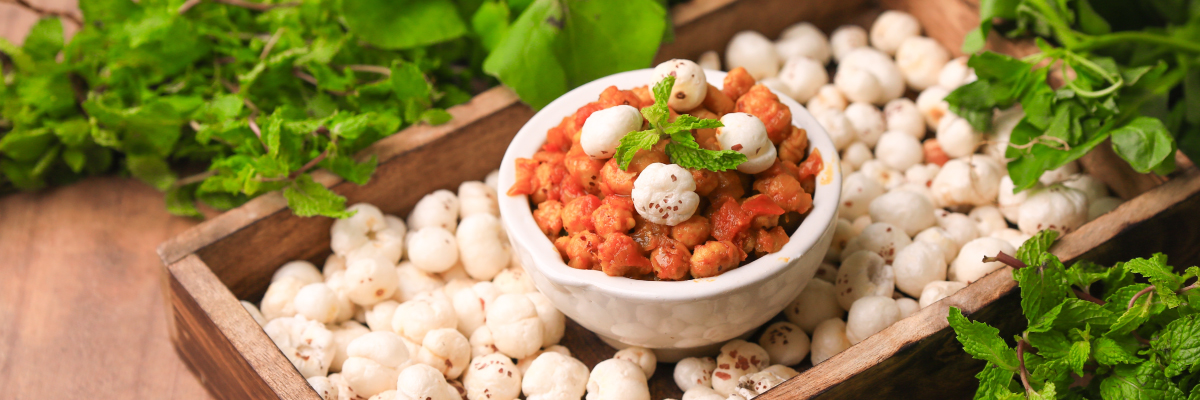Makhana has been rapidly gaining global recognition as a superfood. Once a staple in Indian households, it has now emerged as a sought-after ingredient in the health food industry, driven by its rich nutritional profile, gluten-free nature and versatility. Recognising its economic and agricultural potential, the Indian government has taken significant steps to boost the makhana industry.
India dominates the global makhana industry, with Bihar accounting for approximately 85% of the country’s total production key districts like Madhubani, Darbhanga, Sitamarhi, Saharsa, Katihar, Purnia, Supaul, Kishanganj and Araria serve as the primary hubs since they have favourable climatic conditions and fertile soil that contribute to the superior quality of makhana.
Bihar’s makhana gained Geographical Indication (GI) status in 2022, recognising its unique quality and traditional cultivation methods. This recognition shall further boost its appeal in both domestic and international markets, adding value to its branding efforts.
The global healthy foods market is envisaged to grow tremendously further positioning makhana as an attractive alternative to traditional snacks. Owing to the health benefits, evolving consumer preferences, and affinity for quick commerce, the global makhana market is experiencing rapid growth, driven by increasing health consciousness and demand for natural, plant-based foods.
India remains the largest exporter of makhana, with major markets including the United States of America, Canada, Australia and the Middle East. Additionally, the functional food industry is incorporating makhana into products like protein bars, cereals and gluten-free snacks, further driving its market expansion.
The Government of India has been instrumental in supporting the makhana industry, introducing several key initiatives. The newly announced Makhana Board in the Union Budget aims to address key industry challenges by streamlining production, ensuring standardised quality control and enhancing branding and export opportunities. Projections indicate that these efforts could increase production significantly, leading to better income for farmers and strengthening India’s dominance in the global market.
The One District One Product (ODOP) Scheme has identified makhana as a priority product in Bihar, offering financial assistance, infrastructure development and training programmes. The Agricultural and Processed Food Products Export Development Authority (APEDA) has played a crucial role in promoting exports, organising trade fairs and facilitating certifications like organic and fair trade to meet global standards. Additionally, the National Horticulture Mission (NHM) supports makhana cultivation by providing subsidies for seeds, fertilisers and irrigation infrastructure. The National Bank for Agriculture and Rural Development (NABARD) also offers financial aid to farmers and entrepreneurs for processing units and storage facilities, helping to reduce post-harvest losses and improve product quality.
Further, the Ministry of Food Processing Industries (MoFPI) implements key programmes such as the PM Formalisation of Micro Food Processing Enterprises (PMFME) Scheme and Pradhan Mantri Kisan Sampada Yojana (PMKSY) to support the growth of small and medium food processing enterprises in makhana value addition.
These initiatives provide essential financial assistance, enhance skill development and improve market access, fostering a more robust and competitive makhana processing sector. The Agriculture Infrastructure Fund (AIF), under the Department of Agriculture and Farmers’ Welfare, provides interest subvention to support makhana value addition, facilitating the development of farmgate infrastructure and strengthening the processing ecosystem.
Despite its immense potential, the makhana industry has historically struggled with challenges such as limited mechanisation, inconsistent quality standards and low global consumer awareness. The Makhana Board is poised to transform the industry by enhancing production, ensuring superior quality and expanding global market reach. By adopting modern processing techniques, strengthening branding and aligning with international quality standards, it aims to address key challenges.
Additionally, fostering public-private partnerships and leveraging e-commerce platforms can further boost Makhana’s global presence, improving market accessibility and profitability for stakeholders.
Makhana, also known as fox nuts or Euryale ferox, is no longer just a traditional Indian snack—it is now a global superfood with immense economic and nutritional value. The establishment of the Makhana Board marks a transformative step in unlocking the sector’s full potential. With increasing consumer demand for healthy and functional foods, makhana presents a golden opportunity for farmers, exporters and investors alike. By tapping into emerging market trends, India can solidify its position as a global leader in makhana production and trade, fostering economic growth while promoting its health benefits worldwide.
This blog is written by Naema Miftah
- https://horticulture.bihar.gov.in/HORTMIS/BAIPP/Downloads/ModelDPRMakhana.pdf
- https://www.cnbctv18.com/budget/union-budget-2025-fm-sitharaman-announces-creation-of-makhana-board-in-bihar-19550503.htm
- https://www.researchgate.net/profile/Dhiraj-Singh-15/publication/344187357_Strategies_for_Export_Promotion_of_Popped_Makhana_in_India/links/5f59b81492851c0789586724/Strategies-for-Export-Promotion-of-Popped-Makhana-in-India.pdf


